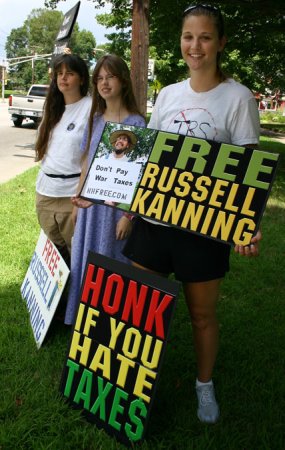When people are arrested, tried, or imprisoned for tax resistance, their comrades have sometimes used this as an occasion to hold rallies or other demonstrations. This shows support for the people being persecuted, demonstrates determination in the face of government reprisals, and can be a good opportunity for propaganda.
Here are some examples:
- When Russell Kanning was convicted for leafletting at the IRS office in Keene, New Hampshire, supporters demonstrated at the jail, holding up “Free Russell Kanning” signs.
- During the Dublin water charge strike, according to one organizer: “The campaign immediately took a decision that when any individual was summonsed to court, we would turn up and contest every case — and that we would turn up in force. … And when the first court appearances took place, over 500 people turned up outside Rathfarnham courthouse to support their neighbours. We marched to the courthouse, had stirring speeches, several songs including ‘You’ll never Walk Alone’ and ‘Bridge Over Troubled Water’ and an amazing sense of our unbeatability.”
- Sylvia Hardy, an elderly woman from Exeter, refused to pay her council tax, calling it highway robbery that the tax rates have risen by double-digits per year, while her pension rises at only 1.7% annually. When she was summonsed to court, she walked alongside banner-waving supporters and was met by a crowd of supporters outside the courthouse.
- Another pensioner who refused to pay his council tax bill for similar reasons, David Richardson, was taken to court in . About fifty supporters demonstrated outside, singing “For He’s a Jolly Good Fellow,” for Richardson.
- Brian Wright was the first person imprisoned for failure to pay Margaret Thatcher’s “Poll Tax” — 700 people held a rally outside the prison to show support. Other prisons holding poll tax resisters were later picketed by protesters.
- When J.J. Keon, a Socialist from Grafton, Illinois, was jailed for refusing to pay what he contended was an illegal poll tax in , Socialist Party spokesman Ralph Korngold came to town and gave a speech outside the prison urging people to join Keon in resisting and to ask why no rich tax dodgers were behind bars.
- Maurice McCrackin was jailed for war tax resistance in . While there, war tax resister Richard Fichter picketed the federal prison camp where he was held. Before that, he’d picketed the courthouse where McCracken was being tried.
- When the IRS took war tax resister Ed Hedemann to court in to try to force him to turn over financial documents to the agency, some 25 supporters, waving signs and handing out leaflets, joined him to demonstrate outside the courthouse before the hearing.
- Prior to war tax resister Frank Donnelly’s sentencing on tax evasion charges in , dozens of supporters rallied outside the courthouse. One supporter noted that “[i]n addition to showing up at his sentencing, Donnelly’s friends in Maine threw three ‘Going-Away-To-Jail Parties’ for Donnelly in the days leading up to his prison sentence. In one party surprise, Donnelly cut into a fresh Maine blueberry pie, and he found a file baked into the pie.”
The women’s suffrage movement in the United Kingdom was particularly noted for its courthouse and jailhouse rallies:
- When Clemence Housman was jailed for failure to pay about $1 of tax in — with the authorities telling her that they were authorized to keep her in jail until she paid up, however long that took — the Women’s Tax Resistance League held a protest outside the prison, and “gave three rousing cheers for Miss Housman, which… it is hoped reached the lonely prisoner in her cell.” The league then organized a procession to the prison gates. The four mile walk, over muddy streets on a rainy day, ended in a surprising victory, as the government had thrown in the towel and released Housman — without getting a penny from her — after five days.
- When a Women’s Suffrage wagon full of activists descended on the courthouse where Janet Legate Bunten was being charged with refusal to take out a license for her dog, the authorities panicked. “The court was twenty minutes late in taking its seat,” a sympathetic observer noted, “and it was freely rumoured that the reason of the delay was that more police were sent for to be in attendance before the proceedings began! There certainly was an unusual number present for so insignificant a court.”
- The Women’s Tax Resistance League organized “a great gathering” to support Kate Harvey who was charged with ten counts of failing to pay national insurance taxes on her gardener’s salary. Following the sentence, they shouted “Shame!” to the judge, then held a “poster parade” to the town square and held a mass meeting there.

